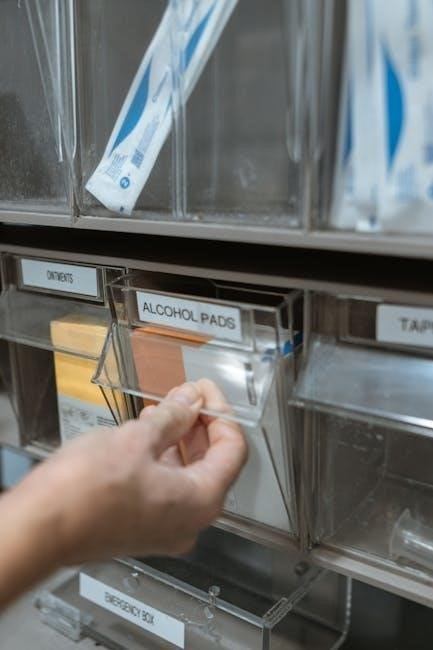The NBME Family Medicine Shelf Exam is a critical assessment evaluating medical students’ clinical knowledge and application in family medicine, emphasizing patient care and evidence-based practices effectively.
Overview of the Exam Format and Content
The NBME Family Medicine Shelf Exam is a multiple-choice exam consisting of 110 questions, divided into two main sections: core content (90 questions) and ambulatory care scenarios (20 questions). It assesses knowledge in diagnosis, treatment, and management of common conditions, with a focus on patient-centered care. Questions include data interpretation and patient management scenarios, testing clinical reasoning and application of medical knowledge. The exam emphasizes evidence-based medicine and practical skills, making it a comprehensive evaluation of a student’s readiness for clinical practice in family medicine.
Importance of the Shelf Exam in Medical Education
The NBME Family Medicine Shelf Exam plays a pivotal role in medical education by assessing students’ mastery of clinical knowledge and application in family medicine. It evaluates their ability to diagnose, manage, and treat common conditions, ensuring readiness for clinical practice. The exam aligns with curriculum goals, providing feedback on strengths and areas for improvement. High scores reflect a strong foundation in evidence-based medicine, while lower scores highlight the need for additional study. This exam is a critical benchmark for competency in family medicine, influencing both student progression and program evaluation.

High-Yield Topics for Family Medicine Shelf Exam
High-yield topics include common ambulatory care scenarios, chronic disease management, and preventive care. Mastering these areas is essential for excelling on the NBME Family Medicine Shelf Exam.
Core Clinical Topics in Family Medicine
Core clinical topics in family medicine include hypertension, diabetes mellitus, and common respiratory infections. These conditions are frequently encountered and require a solid understanding of diagnosis, management, and prevention. Additionally, preventive care, such as vaccinations and screening guidelines, is emphasized. Pediatric and geriatric care are also critical, focusing on age-specific health issues. Mental health, including depression and anxiety, is another high-yield area. Mastery of these topics is essential for success on the NBME Family Medicine Shelf Exam.
Common Ambulatory Care Scenarios
Common ambulatory care scenarios include managing acute conditions like cough, sore throat, and urinary tract infections, as well as chronic diseases such as diabetes and hypertension. Preventive care, including vaccinations and health screenings, is also a focus. Students should be adept at handling pediatric and geriatric cases, addressing mental health concerns, and performing routine procedures like wellness exams. These scenarios test the ability to apply clinical knowledge in real-world, outpatient settings, emphasizing patient-centered and evidence-based care, which are heavily tested on the NBME exam.
Study Resources for Success
Essential resources include textbooks, online question banks, and clinical guidelines, providing comprehensive coverage of family medicine topics and reinforcing knowledge for exam success.
First Aid for Family Medicine Boards
First Aid for Family Medicine Boards is a high-yield study guide designed to help medical students and residents excel on the USMLE Step 2 and NBME shelf exams. The third edition, published in 2017, provides concise, board-tested content covering thousands of topics relevant to family medicine. It includes practical exam strategies, clinical pearls, and mnemonics to enhance retention. This resource is widely recommended for its focused approach, making it an essential tool for last-minute review and exam preparation. Its clarity and organization make it a favorite among students seeking to master key concepts efficiently.
UWorld Question Bank for Family Medicine
The UWorld Question Bank for Family Medicine is a trusted resource for students preparing for the NBME Shelf Exam and USMLE Step 2. It features over 2,000 clinically relevant questions that mirror real exam scenarios, ensuring a thorough understanding of core concepts. Each question includes detailed explanations and evidence-based rationales, reinforcing learning and critical thinking. The platform’s adaptive difficulty and performance tracking tools help identify weak areas, allowing focused study. With its emphasis on high-yield topics and realistic simulation, UWorld is a cornerstone in exam preparation, helping students achieve their target scores efficiently.
PreTest Family Medicine
PreTest Family Medicine is a comprehensive question-and-answer review book designed to help students excel on the NBME Shelf Exam and USMLE Step 2. It contains 500 clinical vignette-style questions with detailed explanations, covering high-yield topics such as ambulatory care, chronic disease management, and preventive medicine; The book emphasizes evidence-based practice and practical clinical scenarios, making it an invaluable resource for identifying knowledge gaps and reinforcing key concepts. Its concise format and focus on exam-relevant material make it a popular choice among medical students preparing for their exams.

Practice Questions and Strategies
Practice questions and strategies are essential for mastering the NBME Shelf Exam. Timed practice exams, such as those in UWorld or First Aid, help build exam readiness and improve time management skills, ensuring students can tackle high-yield topics efficiently during the actual test.
Sample Questions and Answer Analysis
Sample questions from resources like First Aid for Family Medicine Boards and UWorld closely mimic the actual exam format, focusing on high-yield topics such as ambulatory care and SOAP notes; Analyzing these questions helps identify knowledge gaps and strengthens clinical reasoning. Each question includes detailed explanations, highlighting why certain answers are correct and others are not. This process enhances understanding of complex scenarios and improves test-taking skills. Regular review of sample questions is a proven strategy to master the NBME Shelf Exam, ensuring familiarity with question styles and content distribution.
Effective Time Management During the Exam
Mastering time management is crucial for success on the NBME Family Medicine Shelf Exam. Allocate 1-2 minutes per question, ensuring enough time for both straightforward and complex queries. Practice with sample questions to improve speed and accuracy. Use the process of elimination to narrow down options, and avoid spending too long on a single question. Skim through distractors to focus on key details. Prioritize high-yield topics, as they often appear frequently. Regularly review First Aid and UWorld to refine your strategy and build confidence for exam day.
Clinical Correlations and Mnemonics
Clinical correlations and mnemonics are essential tools for mastering family medicine concepts. Mnemonics simplify complex topics, aiding retention and recall during exams. Use SOAP notes to structure patient data effectively and identify high-yield diagnoses. These strategies, outlined in First Aid, enhance clinical reasoning and problem-solving skills, ensuring exam success.
SOAP Notes and Their Significance
SOAP notes are a standardized method for documenting patient encounters, consisting of Subjective, Objective, Assessment, and Plan sections. They are crucial for clear communication and organized thinking in clinical settings. In the context of the NBME Family Medicine Shelf Exam, mastering SOAP notes helps structure patient data effectively, ensuring accurate diagnoses and treatment plans. First Aid for Family Medicine Boards emphasizes their importance in high-yield scenarios, aiding in rapid identification of key clinical findings. Proficiency in SOAP notes enhances critical thinking and time management during exams, reflecting real-world patient care skills.
Mnemonics for High-Yield Topics
Mnemonics are powerful tools for retaining high-yield information, especially in family medicine. First Aid for Family Medicine Boards includes memory aids like the “OPQRST” pain assessment and “SAFER” mental health framework. These mnemonics simplify complex concepts, aiding in quick recall during exams. They also align with clinical pearls and high-yield topics, making them indispensable for NBME Shelf Exam preparation. By mastering these mnemonics, students can efficiently organize knowledge and improve exam performance, ensuring they apply key concepts accurately in clinical scenarios.

Common Pitfalls and Mistakes to Avoid
Overconfidence and poor time management are common pitfalls. Neglecting high-yield topics and failing to review mistakes can hinder performance. Prioritize thorough preparation and practice with sample questions.
Understanding Exam Mistakes and Learning from Them
Identifying and analyzing mistakes is crucial for improvement. Reviewing incorrect answers helps clarify misconceptions and strengthens knowledge gaps. Utilize resources like First Aid for Family Medicine Boards and UWorld to understand error patterns. Focus on high-yield topics and common pitfalls. Practice with sample questions to refine test-taking strategies and time management. Reflecting on errors enhances problem-solving skills and boosts confidence. Learning from mistakes ensures a more targeted and effective study approach, ultimately improving performance on the NBME Family Medicine Shelf Exam.

Updates and Changes in Family Medicine
Family Medicine continues to evolve, with updates in guidelines for chronic disease management and preventive care. Stay informed about recent advances to optimize your exam preparation effectively.
Recent Advances in Family Medicine Practice
Family Medicine has seen significant updates, including new treatment protocols for chronic diseases like diabetes and hypertension. Updated guidelines emphasize preventive care, mental health integration, and telemedicine expansion. Advances in point-of-care technologies and personalized medicine are transforming primary care delivery. These changes are reflected in the First Aid for Family Medicine Boards, ensuring exam preparation aligns with current practices. Staying informed about these updates is crucial for both clinical excellence and success on the NBME Shelf Exam, as they often appear as high-yield topics in exam questions.
Mastering high-yield topics and using resources like First Aid for Family Medicine Boards are key to success in the NBME Shelf Exam and future practice.
Final Tips for Exam Preparation
To excel on the NBME Family Medicine Shelf Exam, prioritize high-yield topics and evidence-based clinical practices. Utilize resources like First Aid for Family Medicine Boards and UWorld for targeted preparation. Regularly practice with sample questions to refine problem-solving skills and time management. Review SOAP notes and clinical correlations to strengthen patient care scenarios. Stay updated on recent advances in family medicine to address emerging topics. Maintain a structured study routine, balancing clerkship duties with dedicated exam prep. Confidence and thorough preparation are key to achieving success on this critical assessment.